Hello Honey! NEWSLETTER October 2022
Hello Honey! NEWSLETTER October 2022
Hello Honey! NEWSLETTER October 2022
Hello Honey! NEWSLETTER October 2022
Hello Honey! NEWSLETTER October 2022
Hello Honey! NEWSLETTER October 2022
Hello Honey! NEWSLETTER October 2022

Hello Honey!
NEWSLETTER
_____________________________________________
October 2022
Good Morning from Vietnam!
We all in the World suffered a great loss
With the Death of Her Majesty Queen Elisabeth II of England
She was an example of Discipline and Mother of Great Britain and many places in the World that belong to the Commonwealth. Also she was mourned by many who lived her from many stories and encounters from her and the Royal Family.
The Queen loved Nature and so some of her flying subjects she cared for all her life had also BEE informed that the Mistress was no more …
See the whole story below.
We recommend all of you in her remembrance with the upcoming autumn and the cooler days to have a nice 'Cuppa' Tea enriched with our Honey from Vietnam.
It is a kingly habit to do so as you can read further down of the new King Charles III who is also a Honey Lover like his mother was.
Son today we say
The Queen is gone – but will never BEE forgotten - long live the King

Herby Neubacher
Communications
Queen Elizabeth II's Bees informed of Her Death
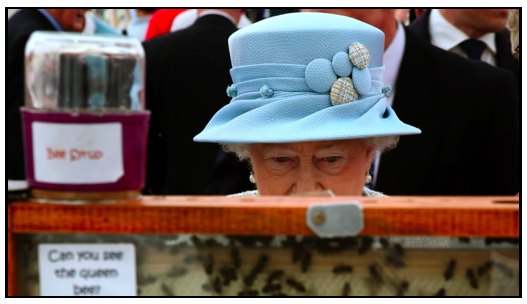
One British colony received special correspondence about Queen Elizabeth II's death last week – not from Buckingham Palace, but the Palace beekeeper. The superstitious and somewhat cute tradition of 'telling the bees' of a death in the family has been part rural British folklore for centuries. It was no different for the death of Britain's longest reigning monarch.
Palace Beekeeper, John Chapple travelled to Clarence House and Buckingham Palace on Friday to tell the seven bee hives. "I'm at the hives now and it is traditional when someone dies that you go to the hives and say a little prayer and put a black ribbon on the hive," the 79-year-old said.
"I drape the hives with black ribbon with a bow."
Mr. Chapple delivered the same message at both locations, in hushed tones:
"You knock on each hive and say, the mistress is dead, but don't you go.
Your master will be a good master to you," he said.
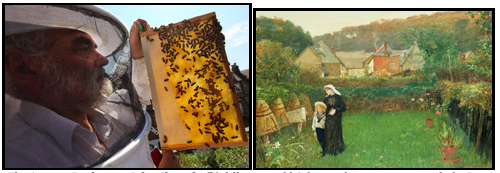
The Queens Beekeeper John Chapple (l.) follows an old Celtic tradition to mourn with the Bees
Across the UK and Europe, many 18th and 19th century magazines, diary entries and paintings refer to the custom of telling the bees.
But the practice may have its origins in Celtic mythology, which held that bees were intermediaries between our world and the spirit world. Whether it is a birth, death or marriage, the bees were be told about all important events in their keeper's lives.
It was believed beekeepers had a strong connections with the bees, so they deserved to be treated like family, and mourn them when they died.
The following stanzas from the Poem Telling the Bees,
(Written in 1858 by American John Greenleaf Whittier)
Before them, under the garden wall,
Forward and back
Went, drearily singing, the chore-girl small,
Draping each hive with a shred of black.
Trembling, I listened; the summer sun
Had the chill of snow;
For I knew she was telling the bees of one
Gone on the journey we all must go!
"Stay at home, pretty bees, fly not hence!
Mistress Mary is dead and gone!
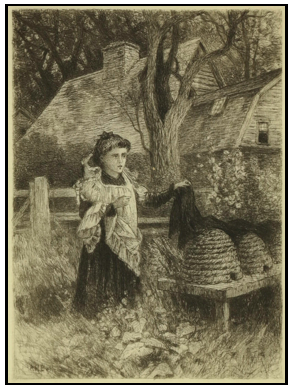
In case of deaths, The Beekeeper also wrapped the top of the hive with a piece of black fabric or crepe. If there was a wedding in the family, the hives were decorated and pieces of cake left outside so that the bees too could partake in the festivities. Newly-wed couples introduced themselves to the bees of the house, otherwise their married life was bound to be miserable.
What happens if the bees are not told?
In the event of a death, the bees were to be put into mourning.
This involved draping the hives in black cloth, leaving funeral food beside them and relaying news of the death quietly. But if the bees were not informed, or put into mourning, it was believed they might stop producing honey, sting their next keeper, or die.
If the bees were not “put into mourning”, terrible misfortunes befell the family and to the person who bought the hive. Victorian biologist, Margaret Warner Morley, in her book
The Honey-Makers (1899), cites a case in Norfolk where a man purchased a hive of Bees that had belonged to a man who had died.
The previous owner had failed to put the Bees into mourning when their master died, causing the Bees to fall sick. When the new owner draped the hive with a black cloth, the Bees regained their health. In another tale, an Oxfordshire family had seventeen hives when their keeper died. Because nobody told them about the death, every bee died. There are plenty of such tales in Morley’s book.
Queen Elizabeth II was reportedly a bee enthusiast, and had a number of hives on the Palace grounds for many years. According to the reports, The Royal Family chefs used the honey in their cooking and sold any leftovers to fundraise for charities.
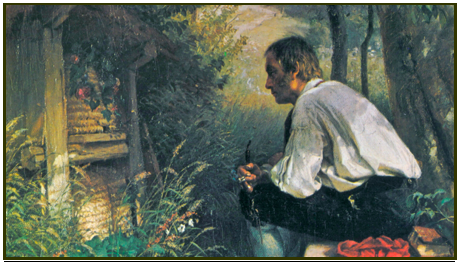
The relationship between Bees and their Keepers have led to all sorts of folklore.
According to one it was bad luck to buy or sell hives, because when you sell one, you sell your luck with your Bees. Instead, Bees were bartered for or given as gifts. If Bees flew into a house, a stranger would soon call. If they rested on a roof, good luck was on its way.
But the relationship between Bees and Humans goes beyond superstition.
It’s a fact, that Bees help humans survive. 70 of the top 100 crop species that feed 90% of the human population rely on Bees for pollination. Without them, these plants would cease to exist and with it all animals that eat those plants.
This can have a cascading effect that would ripple catastrophically up the food chain. Losing a beehive is much more worse than losing a supply of honey. The consequences are life threatening. The act of telling the Bees emphasizes this deep connection humans share with the insect.
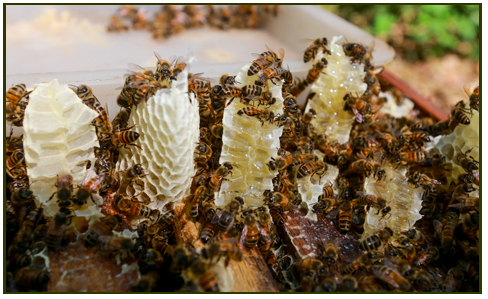
So the Autumn is coming the first cold days in the year long for a nice ‘Cuppa’ like the British say – a nice cup of Tea flavored with Honey …
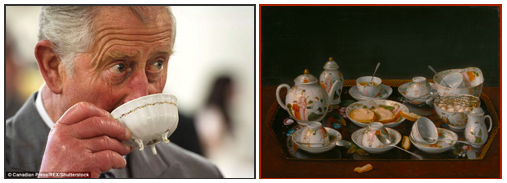
Like the new King Charles III. Of England formerly know as ,Prince’ Charles …
According to Royal experts, King Charles has a strict set of rules for his Royal butlers to follow and makes sure everything is made to perfection for his daily cup of tea.
The butlers are expected to make and serve the tea in quite a particular way. Samson explains 'The key is to use loose tea and a teapot - one teaspoon of tea leaves per teacup plus an extra one for the pot. The water must be heated to 70C for green tea and 100C for Earl Grey or English breakfast tea. The temperature of the water must be measured with a thermometer.'
A perfect royal brew should use organic honey instead of sugar which is added to the teacup before the tea is poured in. There are specific details about how the teacup should be positioned – the handle of the teacup must be placed to the right, with the teaspoon under the handle.'
There is a lot to remember when it comes to making tea for King Charles!
So enjoy like a King with Royal VietThanh Honeys from Vietnam!
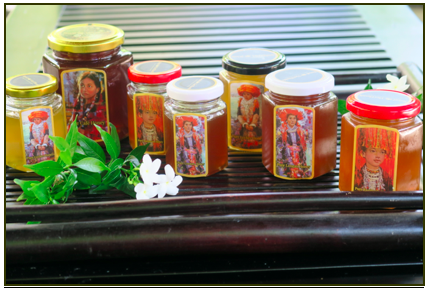
Brought to you by:
ROYAL VIET THANH
HONEY EXPERTS
Contact:
Mr. Trung Vu
Co-Owner & CCO
Headquarter: 59 Truong Son Street, Tan Binh Ho Chi Minh City, Vietnam.
Factory: 153 Ho van Tang Street, Tan Phu TrungCu Chi District, Chi Minh City, Vietnam.
Direction Calling: +84-88 834 3333
Viber/WhatsApp: +84.888 34 3333.
Email: trungvu.vietthanhfood@gmail.com
Website: www.vietthanhgroup.com.vn
More posts
Hello Honey! NEWSLETTER Anuga - 26/10/2023
Hello Honey! NEWSLETTER August 2023 - 18/08/2023
Hello Honey! NEWSLETTER July 2023 - 18/08/2023
Hello Honey! NEWSLETTER June 2023 - 18/08/2023
Hello Honey! NEWSLETTER May 2022 - 18/08/2023
Hello Honey! NEWSLETTER April 2023 - 18/08/2023
Hello Honey! NEWSLETTER February 2023 - 18/08/2023
Hello Honey! NEWSLETTER February/ March 2023 - 18/08/2023





